Rob Sanders's Blog, page 14
March 24, 2012
G is For...

Continuing my A-Z of creative influences, Gattaca is a science fiction film starring Ethan Hawke, Uma Thurman and Jude Law. It is directed by Andrew Niccol and has a fantastic score composed by Michael Nyman. When I first watched this film, it impressed with with its stark representation of the future. It's a future that rings true, however, when you consider some of the social implications of technologies being developed in the present. At the heart of the film there beats a heart so determined to succeed and overcome almost impossible odds, that it is hard not to get swept up in the drama of it all. Many films profess such a accolade, but Gattaca really is a film that examines what it is to be human - on all kinds of levels. It is a film with a grand message, set against the backdrop of a future society and space exploration. It reminds film makers and authors that sometimes the best science fiction stories are told without the need for huge combat set pieces and special effects. I highly recommend this film to anyone who wants something a little different to refresh their science fiction palate.

Synopsis (from IMDB)
In the not-too-distant future, a less-than-perfect man wants to travel to the stars. Society has categorized Vincent Freeman as less than suitable given his genetic make-up and he has become one of the underclass of humans that are only useful for menial jobs. To move ahead, he assumes the identity of Jerome Morrow, a perfect genetic specimen who is a paraplegic as a result of a car accident. With professional advice, Vincent learns to deceive DNA and urine sample testing. Just when he is finally scheduled for a space mission, his program director is killed and the police begin an investigation, jeopardizing his secret.
Published on March 24, 2012 17:03
March 19, 2012
"An Excellent Story All In. No More To Say."
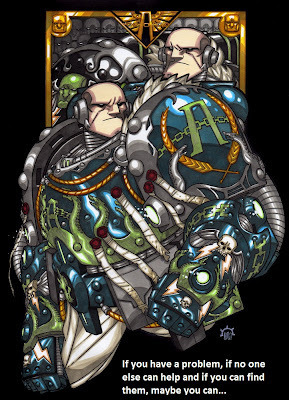
More news from The Founding Fields . This excellent review site really has its shit together. With Black Library (as well as several other key Science Fiction publishers increasing their range and output, The Founding Fields have recently brought in some new blood to bolster the ranks of their steely-eyed veterans. Shadowhawk and EJ Davies are two such worthy recruits and between them they are already racking up some serious critical output. Today we have an advance review by EJ Davies on my Horus Heresy novella The Serpent Beneath, contained within the collection The Primarchs.
'EJ Davies takes on the latest in the Horus Heresy series with the Christian Dunn edited collection of four novellas entitled The Primarchs focussing on Fulgrim, Ferrus Manus, Lion El' Jonson, and the twins Alpharius and Omegon.
"A superb collection of stories, with some expansive ideas setting great events in motion for the later payoff in the Heresy. Great stuff." ~ The Founding Fields
From our friends at Black Library:
"Created in the Emperor's own image, the primarchs had long thought themselves to be princes of the universe and masters of their own destiny – they led the Space Marine Legions in glorious conquest of the galaxy, and no enemy of the Imperium could stand against them. However, even amongst this legendary brotherhood, the seeds of dissent had been sown long before the treacherous Warmaster Horus declared his grand heresy.
Gathered within this anthology are four novellas focusing on some of the mightiest warriors and leaders that mankind has ever known – Fulgrim, Lion El'Jonson, Ferrus Manus and the twin primarchs Alpharius and Omegon – and the roles that they may have yet to play in a war which threatens to change the face of the Imperium forever."
...
The Serpent Beneath – Rob Sanders.
My other favourite legion (my other other being VII) gets an outing with Omegon preparing an operation – Operatus Five-Hydra – gathering intelligence, personnel, and materiel as required. We get to see the inner workings of a legion first appearing in, ah, Legion and getting some more great Heresy time. I really enjoyed Rob's The Long Games at Carcharias which proved he had some excellent ideas for the Alpha Legion in 40K and it was wonderful getting to see him play in the big sandbox of 30K.
This is a wonderfully written, delivered, and planned piece of work. From outset, to completion, this is great stuff. Real 'A-Team' kinda stuff, but with Space Marines. The narrative is broken up with scenes of action – so as we see the planning of the operation, we then see the execution. Example: We need this person for this operation – next section: we see that person extracted, or secured. It's a really nicely put together story that ramps up the action towards the end. AND we get a great twist towards the end, the like of which we expect from the Alpha Legion. At no point did I ever feel myself veering away from the story.
An excellent story all in. No more to say.
Overall.
In terms of an anthology this hangs together well. We start well, we end well, and the two stories in the middle are still very good. Does this further the Heresy for us? Not really, but it does set up some interesting plot threads for the future ... The highlight of all of them was The Serpent Beneath - and I'm hoping the Rob gets the opportunity to write more Alpha Legion, but then after Legion I wanted Dan to write more. So I hope they collaborate and make me a very happy nerd / man.
All in all, this is a great addition to the Heresy saga overall. Well worth the money.
The Primarchs will be available from all reputable (and some baseborn) retailers in June.'
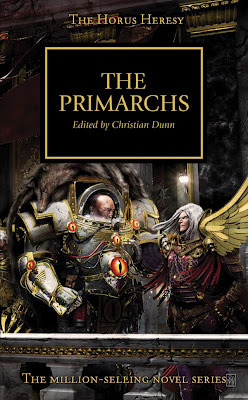
EJ's full advance review of The Primarchs can be found here on The Founding Fields site. In the full review he checks out Graham McNeill's The Reflection Crack'd , Nick Kyme's Feat of Iron and Gav Thorpe's The Lion. Well worth a look. You can find more of EJ's reviews here and his blog here.
Published on March 19, 2012 16:06
March 16, 2012
The Signature of Civilisations
"Art is the signature of civilisations" - Beverly Sills
Words are really my business but great Black Library artists like Jon Sullivan, Stefan Kopinski and Neil Roberts are magnificent ambassadors for Warhammer and Warhammer 40k writers. There's a great deal of creative work on the internet relating to the Warhammer universes, and although not legitimate in the same way as a Games Workshop commissioned piece of art for a novel front cover or a codex, these pieces of art a wonderful in both their skill and variety. I'm not above admitting that I often use them here on the blog to illustrate the content of my posts. I've decided that it's not really fair to do this without appropriate recognition. I've therefore dedicated the bottom section of the blog to the original pieces of art that I use as a mini showcase, with the artist's name when I can track it down. If you would like to see more of their work then a swift internet search on Google or the excellent Deviantart site should do the trick.
On a similar theme I was sorry to see that Star Wars concept artist Ralph McQuarrie died earlier this month. I loved his concept pieces for Star Wars, The Empire Strikes Back and Return of the Jedi and remember seeing them first as a child. The pictures speak for themselves. R.I.P. Ralph McQuarrie.
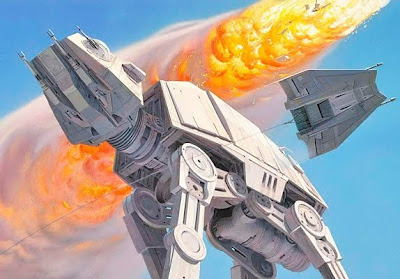

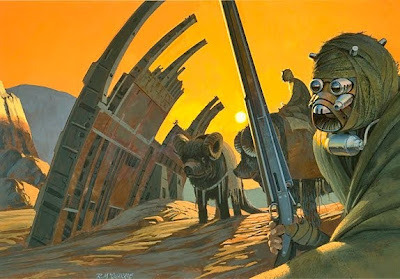
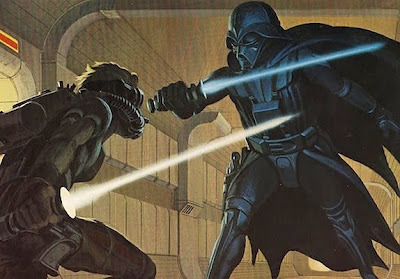
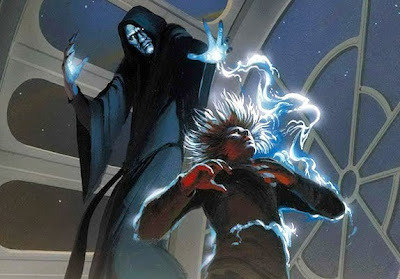
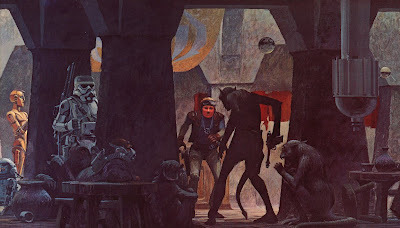

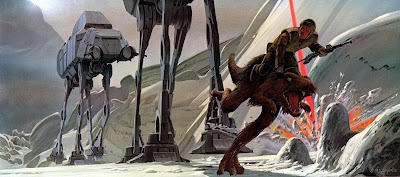
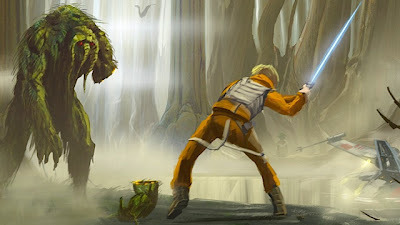

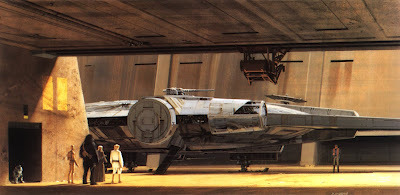
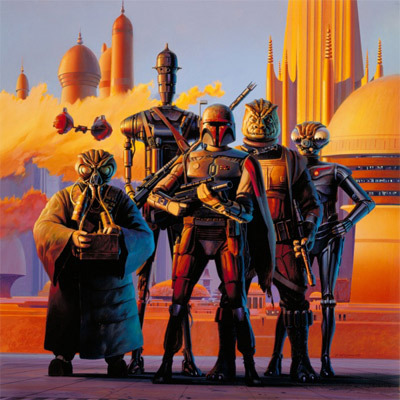
As a bonus, here is another atmospheric Ralph McQuarrie piece, but it is not concept art for the Star Wars films identified above. Extra brownie points for those who know where it is actually from. Something else from my youth.
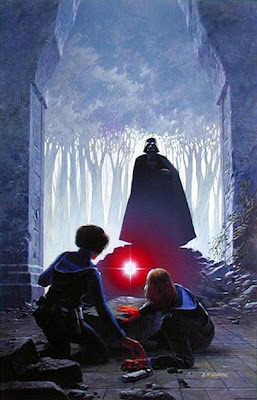

Words are really my business but great Black Library artists like Jon Sullivan, Stefan Kopinski and Neil Roberts are magnificent ambassadors for Warhammer and Warhammer 40k writers. There's a great deal of creative work on the internet relating to the Warhammer universes, and although not legitimate in the same way as a Games Workshop commissioned piece of art for a novel front cover or a codex, these pieces of art a wonderful in both their skill and variety. I'm not above admitting that I often use them here on the blog to illustrate the content of my posts. I've decided that it's not really fair to do this without appropriate recognition. I've therefore dedicated the bottom section of the blog to the original pieces of art that I use as a mini showcase, with the artist's name when I can track it down. If you would like to see more of their work then a swift internet search on Google or the excellent Deviantart site should do the trick.
On a similar theme I was sorry to see that Star Wars concept artist Ralph McQuarrie died earlier this month. I loved his concept pieces for Star Wars, The Empire Strikes Back and Return of the Jedi and remember seeing them first as a child. The pictures speak for themselves. R.I.P. Ralph McQuarrie.












As a bonus, here is another atmospheric Ralph McQuarrie piece, but it is not concept art for the Star Wars films identified above. Extra brownie points for those who know where it is actually from. Something else from my youth.

Published on March 16, 2012 21:09
March 13, 2012
10 Popular Pastimes That Share More With Warhammer Than You Think
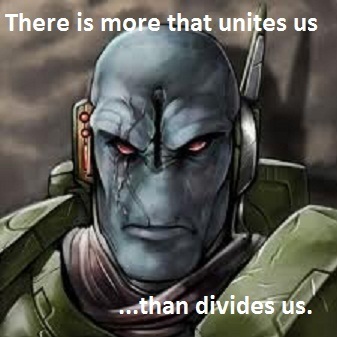
The BBC ran an article by journalist Samira Ahmed today about Warhammer 40k called 'Why Are Adults Launching Tabletop War?' Samira Ahmed is a news anchor on Channel 4 News but seemingly writes for the BBC also. It's interesting to see Warhammer getting some attention in the mainstream media: I don't have any truck with Samira Ahmed's reporting usually and find her a watchable anchor, but the article smacked a little of lazy journalism. Let me explain what I mean.
A key point raised in the article was the fact that Game Workshop – the company that produces Warhammer games and associated media – is a British success story: a British company that is performing well at a time when many other companies are suffering. The astute journalistic question to ask is Why? Instead of following her journalist's instincts and pursuing an answer, Samira Ahmed decides to play a populist card and go for a cheap shot: something more worthy of a Tabloid jibe. This disappoints because it is not my usual impression of her. The line she ultimately takes on the story is given away in the title: 'Why Are Adults Launching Tabletop War?' This was changed from earlier in the day when it was 'Why Are Grown Men Launching Tabletop War?' – a line still contained within the article standfirst. The title and article it heralds sets up a 'them' and 'us' dynamic, which appeals to all those who don't share a particular pastime to point fingers at a specified group. The words 'Grown Men' are particularly indicative of this and sets a tone of disapproval – especially when framed in a question. This effect could have been softened - and made more friendly and conversational with the use of the word 'So' before the question. Instead it reads as: Why Are Grown Men Launching Tabletop War?' like it is some kind of bizarre mystery that needs solving.
This goes on in the article, which I won't deconstruct, but leaves the reader with the vague impression of something odd. There is a distance to the reporting in which little of the passion or admiration for the people and the hobby comes through – it is held at arm's length and looked at from afar. This objectifies the subject matter and presents it as 'different' or 'other'. This, of course, has little to do with the Warhammer enthusiasts who were involved. They did an admirable job. Rather than sing the praises of people whose pastimes don't involve actual violence or cost the Taxpayer millions of pounds to secure and clear up, the best the actual article can seem to do is question the pastime's validity: 'Why are' adults doing this? The most charitable thing I can say about Samira Ahmed's reporting is that it demonstrates a general misunderstanding of the subject matter. Thanks for shining a brief light on an area of culture that most people don't understand but intentionally or inadvertently, you have probably created further perplexity and reinforced stereotypes (both those of players and those that don't play but view it as distant and strange). She just doesn't 'get it' and therefore isn't a great advocate for the pastime. Despite the fact that her son plays the game (and therefore feeling that she can't personally trash it) she doesn't know what to do with the material and so ironically runs for the safe ground of prejudice and ignorance. This is exemplified in the comments from the general public that followed. Many were supportive of the hobby but a significant number were predictably negative and aggressive. They didn't need to disagree with the article - because it gave them nothing to oppose - and so they felt very comfortable with their negativity in such a forum.
Perhaps it's refreshing that the article didn't outright attack the pastime. Let's not be complacent though. Journalists can do better. People can do better. From my point of view, the difference between people involved in the hobby and those that aren't is pretty non-existent. People like to define themselves by what they are not. This is largely a superficial distinction and people often share a great deal more than they realise. Here's 10 Popular Pastimes That Share More With Warhammer Than You Think:
10. Watching / Reading The News
It seems appropriate, since we've already been looking at it, to start with the News. People spend a good deal of time watching the news on television, reading a newspaper or scanning the internet. We are interested in the world about us and want to understand more. Warhammer 40k is a science fiction milieu and science fiction as a genre has excellent credentials for helping people understand the world in which they live. Science Fiction has always been about the present rather than the far future. Think of Orwell and Huxley: they weren't only making insightful observations about their worlds through Science Fiction – their observations have remained relevant to 'our' present. Science Fiction can afford to be more daring in its observations that the news – even Warhammer. There are some very interesting parallels to be drawn between the perspectives and representations of the milieu and present-day concerns – ideas that mainstream media is too gutless or politically strait-jacketed to explore.
9. The Internet
People love the internet: from children to the elderly and everyone else in between – most people like spending time on the internet. Regardless of your particular bent, one thing that we can all agree on is that we all love the interactive nature of the internet and its myriad choices. Warhammer 40k is an interactive game in which the player's choice is at the heart of how the contest unfolds. Like the internet – there are restrictions on where and what you can do (i.e. the rules) – but within the main body of the game you have the freedom to follow your inclinations, wherever they may lead you. You win or lose largely based upon your decisions. Some scientists claim that the internet is even changing the way human beings think. It is reasonable to think then that pastimes that reflect the interactive nature of such pursuits - like Warhammer - are likely to become ever more popular.
8. Sport
Everywhere you look there are people indulging their love of sport. You turn on the television: televised matches. You drive past a playing field on a Sunday – you find middle-aged men playing five-a-side rather than the teenagers that are usually there. You turn on the news – almost as much time is spent on sport than the rest of the national and international news. The same in newspapers. It seems our society is saying it is acceptable - perhaps even appropriate - to play games and indulge in sport as a pastime, regardless of your age. This is largely about competition and tribalism. We like sides to support – often defined by different colours and appearance – and will gather to watch competitions played out between selected groups. Football is the most popular sport in the country. There are few differences between people's interaction with football and Warhammer. Watch both sets of people. One set is gathered around either a television or stadium, while the other is gathered about a table. Both sets are animated and enthused, literally shouting on their respective teams – calling out advice and strategies, desperately willing their side to a win. Both sets of people have a geeky knowledge of their teams – names, statistics, histories. It could be argued that the football supporters take this one stage further. Only a small percentage of Warhammer 40k players dress up as their characters and teams. Football supporters love to indulge in costume homage, pulling on a Rooney t-shirt in official team colours (remember that there are different kits for different circumstances). Some supporters literally live in their kits and t-shirts. Sport enthusiasts are very similar to Warhammer enthusiasts but it seems here more than anywhere else that society has a double standard and perhaps a self-imposed blind-spot.
7. Computer and Console Games
People love to role-play. Playing computer and console games is a very popular pastime. People forget that whatever game they are playing, they assume a persona – whether pre-arranged – or create one themselves from scratch. Computer and console games are increasingly invested in the role-play opportunities increasingly demanded by their players. Even a basic shoot-em-up positions the player behind the weapon, making choices as the character in the depicted situation. They do not make decisions based upon their characteristics – rather the characteristics of the persona they are assuming, whether it be a Special Forces soldier, bank job wheel man or intergalactic bounty hunter. Warhammer is much the same. You make decisions as the commander of the army, assuming strategies and approaches fitting with the nature of the force rather than yourself. There are even popular computer games that simulate the exact same perspective, but digitally realised instead on played out across a table. In this way, the millions and millions and millions of computer game and console players share a great deal with Warhammer gamers.
6. Going to the Pub and Club
Human beings are a sociable breed. People like to socialise: to spend time with one another – rather than alone – and interact with one another. Every city centre in the country is dominated by such people on Friday and Saturday nights. Many like to drink. Many like to pretend that they are something they are not (braver, prettier, funnier, more popular) and some even like to fight with one another. Clubbers certainly don't have a monopoly on alcohol. The room next door to the Warhammer World tournament hall is a large bar, for example. Similarly, for a few hours, Warhammer enthusiasts like to pretend that they are something they're not. And yet, like some clubbers and pub-frequenters, they do like to fight - mostly on the tabletop. Doesn't sound all that different. At the heart of both endeavours is the desire to reach out and be with people who share your interests. This irony is lost on those who like to portray wargamers as single people, who socialise little and have problems with social interaction. How can you be alone when your pastime actually requires you to spend time with other people?
5. Gambling
Gambling is a very popular pastime. Many people like to gamble – whether that be playing poker, shoving coins down slot machines, playing Bingo or playing the National Lottery. People are mesmerised by games of chance and the probabilities of winning or losing. Warhammer is no different. Points are allocated where players believe they will generate the greatest chance of success. There are the complexities of chance generated by the interaction between player freedoms – what will you do as opposed to your opponents' reactions. Then, of course, there is actual chance – represented through dice: giving all that play a stake in potential success. The same impulse drives both types of games and pastimes. The desire to win against the odds.
4. Personalisation
People spend a large amount of time personalising. They sit on buses changing their phone backgrounds, at home on their laptops moving items around the desktops and making design calls on the appearance of their Facebook and Twitter pages. We are obsessed with personalising. Forget electrical goods. Consider the amount of time people spend ensuring that clothes items match. What about shoes? Accessories? Think about how long people spend personalising their gardens with regular adaptations and periodically revisit the colour schemes of their homes – paint, wallpaper, carpets and curtains. This preoccupation is alive and well in all of us. Warhammer enthusiasts simply extend this natural consideration to their armies. They spend similar time and artistic care on ensuring that their model representations appear uniform and reflect their personalities as players. No different.
3. Immersion
Life can be grim. And if you're lucky then it at very least can be boring. Most people like to spend time away from the everyday reality of their lives. They like to suspend their disbelief and spend time elsewhere – with fictional characters and in fictional places. Most people watch television and immerse themselves in the lives of fictional others – whether that be drama (of various genres), soap operas or reality television. A lot of people like to immerse themselves in fiction. They like to live the thoughts and emotions of characters and narrators – they like to forget their own lives for a while. Warhammer is much the same. It is pleasurable to not have to worry about your own concerns for a while – instead displaying empathic concern for characters and units, the objective it is of your opponent to threaten. The desire to immerse yourself in another setting, with fictional representations is common to all the pastimes identified above – including Warhammer.
2. Playing Games
We are a nation, if not a planet, of game players. We adore them. It might be getting the Monopoly board out with relatives, playing card games, maintain farms on Facebook, playing minesweeper or Bejewelled. Games everywhere. They're on our phones, our computers and our televisions. They're in our magazines, newspapers and in designated cupboards in our houses. They're in our workplaces and pubs. Some people even take their game playing to the woods with paintball guns and shooting ranges with real weapons and live ammunition. Games are associated with children but most of the games played in the world are played by adults. People enjoy all sorts or games. They're relaxing and fun. Warhammer is a game. Enough said.
1. Education
Far from viewing Education as something like extra work to be avoided, many people view education as a pastime. People simultaneously play and watch quiz shows. They do crosswords and Sudoku puzzles. Some people even voluntarily take courses because they know they are enhancing themselves and their abilities in some way. Warhammer is not only fun and immersive, it's effortlessly educational. Beyond the vocabulary-extending text contained within the background material and the probability and number skills developed as part of the game, Warhammer is a natural successor to Chess. While Chess is in no danger of being superseded any time soon, the two share similarities. Both are tactical wargames relying upon strategy and logical thinking. It has long been appreciated that Chess helps to develop thinking skills. There is nothing magical about Chess and the benefits it conveys. Warhammer similarly activates and trains certain faculties of the brain and as such can be considered to be teaching players at the same time as entertaining them.
Published on March 13, 2012 21:16
March 11, 2012
Fielding Your Best
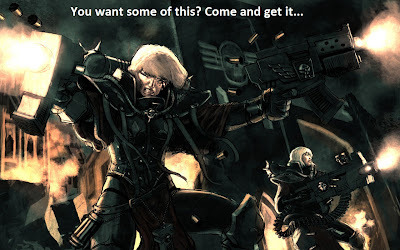
It's really great to see what different reviewers make of the same novel. Everyone comes to a text with their own insights and areas of favoured focus. My novel Legion of the Damned has received some nice attention from renowned reviewing site The Founding Fields. I have another here from prolific reviewer Bane of Kings, which I enjoyed reading and encourage you to do likewise. Bane of Kings other reviews for The Founding Fields can be found here.
" "An action-packed novel with gripping characters and several bloodthirsty battles. Rob Sanders at his best." ~The Founding Fields
"I believe that this is one of the first times that the Legion of the Damned makes an appearance in one of Black Library's titles, as well as the first time that the Feast of Blades makes an appearance in Black Library lore. For all of those who don't know what the Feast of Blades is, it's a centennial honorific competition between twelve Space Marine Chapters (three examples are the Imperial Fists, Crimson Fists and Iron Knights), and has only appeared as of the fifth edition Space Marine Codex.
Right, now that you should understand what the Feast of Blades is about, let's get on with the review for Legion of the Damned. The novel itself, at first – looks like it should be named after the adventures of the Excoriators Chapter, descendants of the Imperial Fists that are the Chapter that takes centre stage in Legion of the Damned, and have a lot more page time than the Chapter of the novel's namesake. The Excoriators are a chapter who have, like the aforementioned Space Marine Chapters, chosen to take part in the Feast of Blades, and Rob Sanders does a brilliant job of portraying it in the novel. Although, don't think the book is all about the Feast of Blades, oh no – it's far from limited to that, for the Feast is only the beginning, as the novel dictates the Excoriators in a battle against the Cholercaust Crusade, consisting of Chaos forces.
The Excoriators are a chapter that has had very little fluff about them, and even I thought that they were a homebrew Chapter at first. However, Rob Sanders does a fantastic job at just illustrating as to exactly how different the Chapter is from its fellow brothers, such as the Imperial Fists, and this is one of the main attractions of the novel itself. Just, the unique-ness of the Excoriators I found to make up for the fact that there was very little appearance of the Legion of the Damned at all in this novel.
In fact, it's not until the last quarter of the novel that they appear, and even then – it's only for a limited time. But, don't let this put you off from reading the book – already I've seen people criticise it for the misinterpretation of the title on various forums such as Heresy Online. However, don't be put off by that – the novel's blurb did in fact mention that the Legion of the Damned would only appear for a short amount of time. Just read, and enjoy what Rob Sanders has to offer. He's an exceptionally skilled writer in my opinion, and knows how to make Space Marines tick. The interactions between the Excoriators are superb, and this is another reason why Legion of the Damned was enjoyable as it I found it to be. The main protagonist of this novel is Zachariah Kersh – an Excoriator, who is well-developed, and an interesting, fascinating character, taking up the most page time in this novel, who adds to the strong cast that Sanders has portrayed in this novel, and is indeed, an interesting take on an adeptus astartes.
Although the novel takes a while to get going, with the pace a little uneven, once you do get into it the pace just flies by at an unstoppable rate, and as I found – you won't be able to let go until the end of the novel, with fantastic action-scenes as we watch the Excoriators do battle against various Khornate hordes, with zombies as an added bonus."
Published on March 11, 2012 16:06
March 7, 2012
Xenos: Seven Alien Species With A Shot At Conquering the 40k Galaxy
I was recently on a seminar panel talking about the Xenos – the myriad species of the Warhammer 40,000 galaxy. A good number of my novels and stories deal directly with or touch upon the Xenos and the seminar really got me thinking about these races. From an author's point of view, any of these races can be represented as a devastating threat and as the background continues to evolve, some become more or less dangerous. Naturally, I reserve the right to change my mind or be persuaded otherwise, but here is my current take on those races who have the greatest chance at completely conquering the galaxy. In reverse order:
7. The Eldar
A species appearing superficially similar to humans, although often described as taller and more elfin. They are both a technologically advanced and psychic race, wielding great power through their martial experience, mystical weaponry and prognostic capabilities. The Eldar suffered a social, cultural and spiritual collapse at the height resulting in fragmentation, stagnation and slow deterioration. They are an elder race of the galaxy, dwindling in number - whose time has passed, despite still being a powerful force to be reckoned with. While anything is possible, they are not serious contenders in respect to galactic conquest due to reduced resources and capability. They seem uninterested in such a broad goal, instead concentrating on the survival of their species in a hostile and ignorant galaxy.
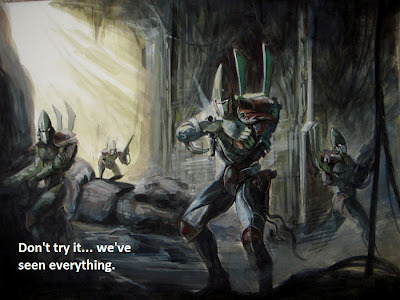
6. The Necrons
The Necrons are a race of robotic, skeletal warriors - the soulless creations of terrible Star Gods from galactic myth and legend. They have lain dormant in secreted stasis-tombs for longer than other xenos races have been in existence and are slowly awakening – ready to mobilise and make the galaxy their dominion. Armed with ancient and terrible technologies, and seemingly self-repairing, the Necrons are regarded as an implacable and impassive force intent on cold victory. The Necrons are certainly more apparently aggressive than the Eldar - the other elder race of the galaxy – but suffer from the same issue. Their time has passed and in the eons they have lain dormant in their tombs, other aggressive and pervasive races have evolved to stand in their way. They are more of a shadowy threat than a likely contenders for conquering the galaxy.
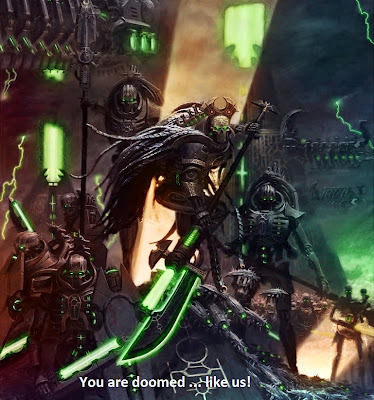
5. Minor Xenos Races
There are innumerable minor xenos races in the galaxy who have achieved sentience but have yet to make their mark: the Kroot, the Nicassar, the Vespid, the Demiurg, the Fra'al, the Galg, the Q'orl, the Hrud, the K'nib, the Tarellian. All bring different attributes to table. The Hrud might be seen as the galactic equivalents of rats or roaches and it would be unwise to bet against a race about which little is known beyond the fact that they are difficult to eradicate while swiftly growing to number to become interstellar plagues. With some, like the Kroot and the Q'orl, much depends upon evolutionary steps that unlock great possibility for the races. Others are already technologically advanced and hostile – like the Fra'al – and a growing threat. One of the reasons that such minor xenos races might not individually appear a threat is the propensity for some of them to form protective alliances with one another. On the other hand, this might signify a greater collective threat for other races who refuse to join their ranks. What makes these minor races more of a threat than much more ancient races is that the galaxy has already witnessed what these older species have to offer: these minor races have yet to have their day (as every Tarrelian 'dog'-soldier must have). They have possibility on their side: the threat of the not-yet-known.
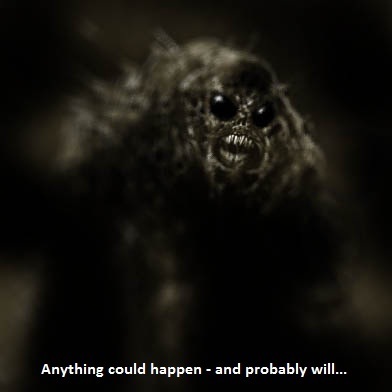
4. The Tau
The Tau are a young, humanoid race, who are highly technologically-advanced for their age. In a very short time they have carved out a small empire in the galactic east and have proved successful in territorial wars against neighbouring, established civilisations. While bringing fantastic new technologies to bear on the battlefield, the Tau are also experts in extraterrestrial diplomacy, bringing many other minor species into a confederacy against other, more hostile species. In exchange for technology and protection, the Tau have recruited a variety of xenos species with different specialisations and abilities to their cause. Each of these races help address weaknesses that the Tau perceive in themselves and this makes the Tau an increasing galactic threat. They regard themselves as a 'Greater Good' in the universe and there is little wonder that other species gravitate towards them when confronted with the bloody example of other brutish and tyrannical races. As well as the Tau's technological and social advantages, being such a very young race, they also benefit from the potential of continued evolutionary development. They learn quickly and seem undaunted by the threat of other alien civilisations on their borders. It is hard not to root for them and their galactic ambitions.
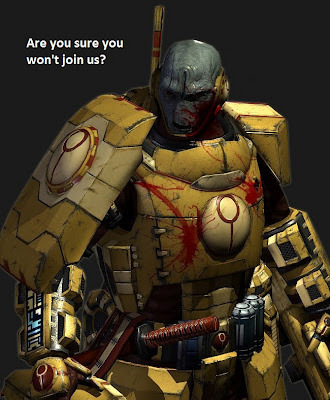
3. The Orks
The Orks or 'Greenskins' are a barbaric and warlike race spread across the galaxy, who have the potential to be the most successful alien species in the galaxy. They are one of the most numerous species, split up into thousands of despotic empires. They have a natural affinity with technology and a savage desire to destroy and kill. Unfortunately for Greenskin dominion, the Orks are so war-like that they cannot help warring with each other as well as everyone else, making it unlikely that they will pool their strength for any great length of time and conquer the galaxy. From time to time their colossal warmongering Waaagh!s remind other species of the devastating potential and the massive swathes of interstellar destruction they can wreak across entire sections of the galaxy. They are certainly numerous enough and stupid enough to attempt a mindless and bloody galactic conquest.
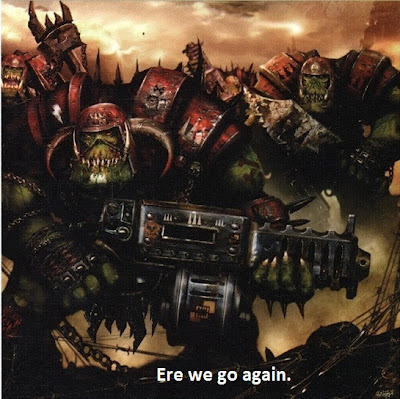
2. Humanity
When examining the potential for galactic conquest, it is difficult not to consider humanity – that most dangerous of species. From the point of view of other galactic species, humanity is probably the middle ground and demonstrates many different advantages. To the Eldar, humanity is probably considered an upstart race – not unlike the Tau appears to humanity. Humans are a technologically advanced race - who have experimented with devastating weapons of mass destruction as well as unlocking the generic possibilities of their race in the Primarchs and the Space Marines. Humanity is relentlessly prejudice, xenophobic and expansive – aggressively defending the vast empire known as the Imperium and mobilising colossal armies across the stars in order to bring extinction to other races. Humanity is also evolving and unlocking further potential in the form of psychic abilities and dangers. Like other aggressive races, one of humanity's most significant weaknesses is its inability not to fragment and war against itself. For this reason, races that are single-minded of purpose stand a good chance against the Imperium and wider humanity – despite all of the advantages humans retain in a war of galactic conquest.
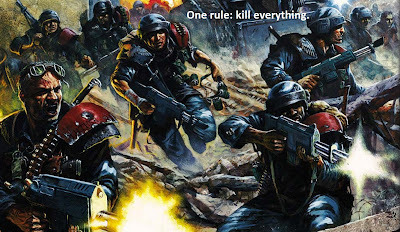
1. The Tyranids
The Tyranids are a terrible extra-galactic race that travels the universe as a monstrous superorganism. Tyranid fleets move from planet to planet, defeating defending species with supra-evolving bio-constructs before assimilating all living matter into their hive fleets to fuel the further creation of terrifying, Tyranid organisms. Every time a Tyranid host defeats an enemy, it takes on its strength and numbers – not only in the raw biological building blocks of new fighting organisms – but also in terms of genetic advantage. If the Tyranids assimilate a psychic race then their new constructs receive the genetic benefits of psychic aggression; defeating hardy races make the Tyranids hardier; defeating races adapted to harsh and unusual environmental conditions makes the Tyranids similarly so. It is this simple approach to galactic conquest that makes the Tyranids clear front runners in the race for domination. Beyond being amongst the most horrific creatures in the galaxy to fight, they are driven by a single hive mind that is relentless in its desire to realise a deep, alien need to assimilate all other races. Victory makes them stronger in every way. The thing that makes Tyranids the most likely galactic conquerors is the fact that they have more than likely already achieved such a feat in their own galaxy. They have form for success. For all any of the other races on this list know, the Tyranids have left innumerable galaxies barren and devoid of other alien life. A chilling, if impressive, notion.
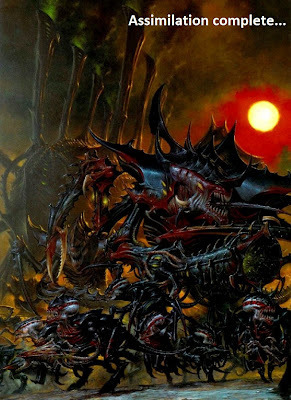
Do you agree?
7. The Eldar
A species appearing superficially similar to humans, although often described as taller and more elfin. They are both a technologically advanced and psychic race, wielding great power through their martial experience, mystical weaponry and prognostic capabilities. The Eldar suffered a social, cultural and spiritual collapse at the height resulting in fragmentation, stagnation and slow deterioration. They are an elder race of the galaxy, dwindling in number - whose time has passed, despite still being a powerful force to be reckoned with. While anything is possible, they are not serious contenders in respect to galactic conquest due to reduced resources and capability. They seem uninterested in such a broad goal, instead concentrating on the survival of their species in a hostile and ignorant galaxy.

6. The Necrons
The Necrons are a race of robotic, skeletal warriors - the soulless creations of terrible Star Gods from galactic myth and legend. They have lain dormant in secreted stasis-tombs for longer than other xenos races have been in existence and are slowly awakening – ready to mobilise and make the galaxy their dominion. Armed with ancient and terrible technologies, and seemingly self-repairing, the Necrons are regarded as an implacable and impassive force intent on cold victory. The Necrons are certainly more apparently aggressive than the Eldar - the other elder race of the galaxy – but suffer from the same issue. Their time has passed and in the eons they have lain dormant in their tombs, other aggressive and pervasive races have evolved to stand in their way. They are more of a shadowy threat than a likely contenders for conquering the galaxy.

5. Minor Xenos Races
There are innumerable minor xenos races in the galaxy who have achieved sentience but have yet to make their mark: the Kroot, the Nicassar, the Vespid, the Demiurg, the Fra'al, the Galg, the Q'orl, the Hrud, the K'nib, the Tarellian. All bring different attributes to table. The Hrud might be seen as the galactic equivalents of rats or roaches and it would be unwise to bet against a race about which little is known beyond the fact that they are difficult to eradicate while swiftly growing to number to become interstellar plagues. With some, like the Kroot and the Q'orl, much depends upon evolutionary steps that unlock great possibility for the races. Others are already technologically advanced and hostile – like the Fra'al – and a growing threat. One of the reasons that such minor xenos races might not individually appear a threat is the propensity for some of them to form protective alliances with one another. On the other hand, this might signify a greater collective threat for other races who refuse to join their ranks. What makes these minor races more of a threat than much more ancient races is that the galaxy has already witnessed what these older species have to offer: these minor races have yet to have their day (as every Tarrelian 'dog'-soldier must have). They have possibility on their side: the threat of the not-yet-known.

4. The Tau
The Tau are a young, humanoid race, who are highly technologically-advanced for their age. In a very short time they have carved out a small empire in the galactic east and have proved successful in territorial wars against neighbouring, established civilisations. While bringing fantastic new technologies to bear on the battlefield, the Tau are also experts in extraterrestrial diplomacy, bringing many other minor species into a confederacy against other, more hostile species. In exchange for technology and protection, the Tau have recruited a variety of xenos species with different specialisations and abilities to their cause. Each of these races help address weaknesses that the Tau perceive in themselves and this makes the Tau an increasing galactic threat. They regard themselves as a 'Greater Good' in the universe and there is little wonder that other species gravitate towards them when confronted with the bloody example of other brutish and tyrannical races. As well as the Tau's technological and social advantages, being such a very young race, they also benefit from the potential of continued evolutionary development. They learn quickly and seem undaunted by the threat of other alien civilisations on their borders. It is hard not to root for them and their galactic ambitions.

3. The Orks
The Orks or 'Greenskins' are a barbaric and warlike race spread across the galaxy, who have the potential to be the most successful alien species in the galaxy. They are one of the most numerous species, split up into thousands of despotic empires. They have a natural affinity with technology and a savage desire to destroy and kill. Unfortunately for Greenskin dominion, the Orks are so war-like that they cannot help warring with each other as well as everyone else, making it unlikely that they will pool their strength for any great length of time and conquer the galaxy. From time to time their colossal warmongering Waaagh!s remind other species of the devastating potential and the massive swathes of interstellar destruction they can wreak across entire sections of the galaxy. They are certainly numerous enough and stupid enough to attempt a mindless and bloody galactic conquest.

2. Humanity
When examining the potential for galactic conquest, it is difficult not to consider humanity – that most dangerous of species. From the point of view of other galactic species, humanity is probably the middle ground and demonstrates many different advantages. To the Eldar, humanity is probably considered an upstart race – not unlike the Tau appears to humanity. Humans are a technologically advanced race - who have experimented with devastating weapons of mass destruction as well as unlocking the generic possibilities of their race in the Primarchs and the Space Marines. Humanity is relentlessly prejudice, xenophobic and expansive – aggressively defending the vast empire known as the Imperium and mobilising colossal armies across the stars in order to bring extinction to other races. Humanity is also evolving and unlocking further potential in the form of psychic abilities and dangers. Like other aggressive races, one of humanity's most significant weaknesses is its inability not to fragment and war against itself. For this reason, races that are single-minded of purpose stand a good chance against the Imperium and wider humanity – despite all of the advantages humans retain in a war of galactic conquest.

1. The Tyranids
The Tyranids are a terrible extra-galactic race that travels the universe as a monstrous superorganism. Tyranid fleets move from planet to planet, defeating defending species with supra-evolving bio-constructs before assimilating all living matter into their hive fleets to fuel the further creation of terrifying, Tyranid organisms. Every time a Tyranid host defeats an enemy, it takes on its strength and numbers – not only in the raw biological building blocks of new fighting organisms – but also in terms of genetic advantage. If the Tyranids assimilate a psychic race then their new constructs receive the genetic benefits of psychic aggression; defeating hardy races make the Tyranids hardier; defeating races adapted to harsh and unusual environmental conditions makes the Tyranids similarly so. It is this simple approach to galactic conquest that makes the Tyranids clear front runners in the race for domination. Beyond being amongst the most horrific creatures in the galaxy to fight, they are driven by a single hive mind that is relentless in its desire to realise a deep, alien need to assimilate all other races. Victory makes them stronger in every way. The thing that makes Tyranids the most likely galactic conquerors is the fact that they have more than likely already achieved such a feat in their own galaxy. They have form for success. For all any of the other races on this list know, the Tyranids have left innumerable galaxies barren and devoid of other alien life. A chilling, if impressive, notion.

Do you agree?
Published on March 07, 2012 16:59
March 5, 2012
And A Good Time Was Had By All
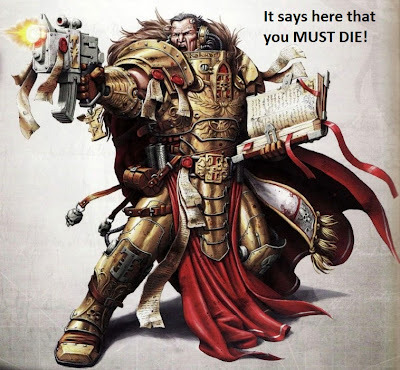
Well, just recovering after the fantastic event that was Black Library Live! 2012. The best year so far, by my reckoning. Here are a few things that I really enjoyed – in no particular order:
-The smooth operation of the entire event. Hats off and deep thanks to all the Black Library crew who ensured that everything ran like clockwork.
-Meeting so many people and signing so many books. It's a personal best for me. I really loved talking to everyone on the day. Thanks for asking me to add a few more words in the front of your books! Such a fantastic group of people – interesting, passionate about their reading and an absolute pleasure to meet.
-The Seminars: I enjoyed these a great deal. All three were really interesting and benefitted from a wealth of great questions from the audience. I hope I was even half as interesting back! Would do these again in a heartbeat!
- Spending time with the Black Library authors and artists. Always a pleasure. We should meet up more often. A big 'Nice to see you again' to Sarah Cawkwell, Graham McNeill, Gav Thorpe, Nick Kyme, Christian Dunn, Andy Smillie, William King, Josh Reynolds, John French, Andy Chambers and Neil Roberts.
-Work is always a pleasure and never a chore at BL and so between signings and seminars it was great crossing the t's and dotting the i's with Laurie Goulding and Graeme Lyon on a few projects.
-Meeting both new and old friends in the bar afterwards! I had a great time shooting the breeze with the people that make Black Library Live really come to life. I enjoyed meeting all of you! Particular shout outs go to some of the Bolt Hole crew: Xisor, Squiggle and Schaferwhat‽ (with whom I put the world to rights over a pint of Bugmans), Narrativium and Shadowhawk (who does not let oceans and continents come between him and an excellent event!). Internet monikers have been used to protect the innocent. I also shouldn't forget Phil 'You didn't forget me' Thorogood. Don't worry, Phil – you are unforgettable. There were others – but I can't put all the monikers to faces – but know that I enjoyed meeting you too! Oh yes – Reds8n, thanks for the Dakka-dice! When asked to do something, I can genuinely no longer say, 'No dice...' If I've missed anyone out - feel free to embarrass me in the Comments. I really wish I could have spent more time with those that came to the event. I look forward to next time!
Well, it's now back to work for me. The keyboard is calling and I have a bunch of cool new projects to get into.
Published on March 05, 2012 19:49
February 29, 2012
Black Library Live! 2012... Bring It!
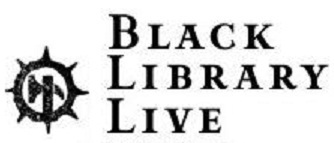
I am really excited about Black Library Live! 2012. For those who aren't aware, Black Library Live! is an annual event celebrating Black Library novels and their authors. It's in its fourth successful year and Black Library Live! 2012 takes place on Saturday 3rd March at Warhammer World in Nottingham. A range of Black Library authors, artists and editors will be in attendance - as indicated below. I'm looking forward to seeing the noble ranks of the Black Library loyal readership - who are always a joy to meet - and perhaps signing some books while I'm at it. I have several signing sessions during the day and will, of course, be jazzed to sign any of my novels, anthologies or limited releases. My two most recent books, my Space Marine Battles novel Legion of the Damned and the Horus Heresy novella anthology The Primarchs will both be available to buy months earlier than their print release date. You're welcome to bring them along and shoot the breeze while I scribble away.
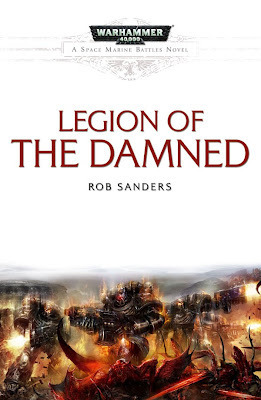
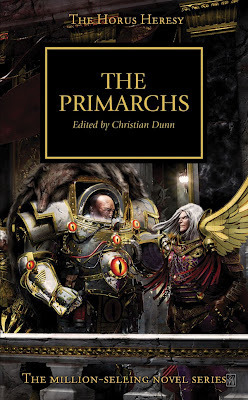
I'm also fortunate enough to have been invited to sit on the panels of three different seminars during the day. These are indicated below and if you attend I'll try my best to answer questions and not ruin the Warhammer universes for you. I look forward to seeing you.
Black Library Live! 2012 Schedule
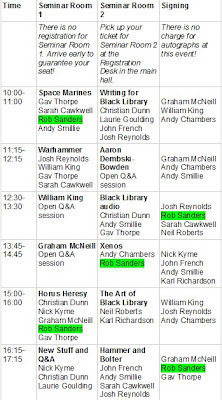
Published on February 29, 2012 18:55
February 27, 2012
FerretBrained
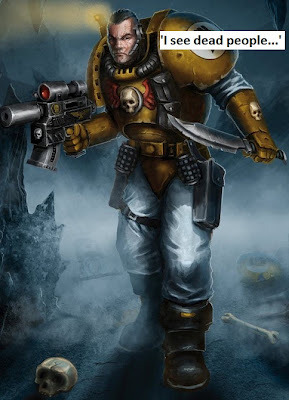
As an author, I'm naturally interested in what readers think of my work and the insights they have into my characters and narratives. I am especially appreciative when readers take the time to commit said insights to paper or pixels. Below is a really thoughtful review of my novel Legion of the Damned from a really interesting e-zine called Ferretbrain. Contributors to the Ferretbrain site review a range of literature – including science fiction and Black Library releases. They also write articles and podcast responses regarding fiction and film. I'm really happy I happened on Ferretbrain and encourage you to check it out. Arthur B is responsible for the excellent review below and more of his Black Library reviews can be found here and on the side bar link. Beware - there are spoilers. Oh, and grab a coffee. Take it away, Arthur...
"How is the book? Well, it's an interesting one. The Space Marine Battles series is pitched as somewhat larger than average Warhammer 40,000 novels based around depicting the iconic battles from the histories of various Space Marine chapters, as alluded to in various 40K army codexes and rulebooks. In practice, this means you are guaranteed three things: the book will be full of Space Marines, the focus will be on enormous epic battles as opposed to squad-based stuff, and if yours is a mind crammed with 40K setting trivia you probably know how each of the books is going to turn out; the exercise here is taking those one-paragraph Codex descriptions of legendary battles and expanding them into interesting stories which make finding out precisely how the events in question unfolded enjoyable.
In this case, Sanders tells the story mostly from the point of view of Zachariah "the Scourge" Kersh, a member of the Excoriators. Like the Soul Drinkers, the Excoriators are a spin-off Space Marine Chapter from Ferretbrain's favourite Chapter, the Imperial Fists, broken off from the Fists after the Horus Heresy when Rogal Dorn reluctantly agreed to split up the original Imperial Fists Legion. Like the Fists and the other Fist successor chapters, the Excoriators proudly bear the genetic heritage of Dorn, and like the Fists themselves like to seek ecstatic communion with Dorn through pain. On top of this, the Excoriators are prone to the Darkness - a catatonic state which they can fall into spontaneously, in which they are overwhelmed by the despair which washed over Rogal Dorn when it seemed that the Emperor had died at the end of the Horus Heresy.
Kersh, when the book begins, is deep in the Darkness, and deep in dishonour on top of that. In the midst of a heated battle with the Alpha Legion faction of Chaos Space Marines, Kersh both allowed Chapter Master Ichabod to be gravely injured by his enemies, but also failed to stop the Legion from stealing the sacred Stigmartyr - the battle-standard which bears the bloodstains of each accepted brother of the Excoriator chapter. Whether Kersh's fall into the Darkness was the result of these dire events or whether it preceded them is left ambiguous: what matters is that Chapter morale is at an all-time low, and more or less everyone blames Kersh.
The Apothecary Ezrachi takes drastic action to awaken Kersh from the Darkness when it becomes clear that he is the only champion of the ten dispatched by the Chapter Master who still has a hope of winning the Feast of Blades - the epic duelling tournament that the Imperial Fists and their successor chapters hold in order to celebrate their shared bonds by hurting each other in a respectful, brotherly way. As it turns out, Kersh wins, and having regained some semblance of honour is promoted to Corpus-Captain and placed in charge of the Chapter's 5th Company - the segment of the Chapter tasked with tracking down the lost Stigmartyr. Before they can crack on with that, however, certain Chapter obligations born of oaths from centuries back oblige the 5th Company to do a minor favour for the Ecclesiarchy - visiting the cemetery world of Certus Minor to lend Space Marine levels of firepower to an investigation into strange Chaos-related phenomena on the planet.
In taking command of the Company on his first mission as a leader rather than a follower, Kersh faces three major challenges. His first problem is that every single Space Marine in the Company hates him - because he lost the Stigmartyr, it's his fault they've been tearing around the galaxy chasing up wild goose chases and getting killed in order to try and get the thing back. His second problem is that he's haunted by a ghostly Space Marine - a mysterious skeleton in power armour which nobody else can see - and he's not sure whether he's losing his mind, suffering the after-effects of the Darkness, or being influenced by the Warp. His third problem is that the Chaos manifestation on Certus Minor turns out to be a beacon that brings the Keeler Comet to the system - and wherever the bizarre, Chaos-tainted Keeler Comet goes, the horrifying Khorne-worshipping horde known as the Cholercaust follows. Led by the terrifying World Eaters legion of Chaos Space Marines, the Cholercaust makes a habit of massacring every living thing on every world they get close enough to - and that puts Certus Minor next up on the omnicide list.
At its core, then, Legion of the Damned is a siege story of the sort which is hardly uncommon in Black Library novels. The first thing a siege story needs is an interesting location for the heroes to defend, because that establishes what the stakes are, gives us some reason to care about the place in question, and helps to explain what the characters' stake in this is. Certus Minor is a great setting for a 40K siege story because it is the sort of ludicrous society which could only exist in the Warhammer 40,000 setting; it's the last resting place of Umberto II, a universally respected leader of the Ecclesiarchy, and so the planetary economy is based mainly around renting out space in graveyards all over the planet so that people from across the Imperium can have the honour of being buried on the same planet as the holy Umberto - that is, for a century or so, before the rent runs out on their plot and they are turfed out for the next customer to go in their place.
The fact that Certus Minor is a cemetary world does at points help shape the action of the book. For instance, the defence of the planet is centred on the mausoleum of Umberto II because the Sisters of Battle have over the years turned it into as impregnable a place as any (but at the same time their priority is defending Umberto's remains as opposed to the living citizens of the planet, putting their leader at odds with Kersh), and Kersh hits on a novel way to use the graveyards to shelter the planetary populace against the invasion. This is all a nice bonus, but it's not the main reason it works so well as a setting. That reason is a lot more straightforward: the cemetary world concept is a simple idea which instantly gives you an evocative image of what the planet is like - lots of shrines, lots of priests and gravediggers, and graveyards as far as the eye can see. We don't get much more detail than this on the world beyond the capital, but as far as totally metal backdrops for a siege story go you don't really need more.
The next thing a siege story requires after an interesting location is interesting defenders, and of course the primary focus of the novel is going to be the Excoriators. As a chapter, these guys take the whole Imperial Fist masochism deal to startling extremes; their daily devotions include the practice of "Donning the Mantle of Dorn", which involves the Marines having their serfs flog them until they are good and bloody before donning their power armour in the hope of attaining communion with Imperial Fist primarch Rogal Dorn through pain. So dedicated are they to this practice that when Kersh wants to punish one of his officers for insubordination he orders him to refrain from being flogged for the next week or so. Likewise, naughty Scouts (who not being full Marines yet don't get to flog themselves) are punished by not being allowed to wear their full armour, so that everyone can see their shamefullly baby-smooth skin which lacks the massive scarring that a full battle brother would be able to display with pride.
As well as making them recognisable off-shoots of the Pain Glove-loving butt-branding Imperial Fists we know and love, the particular form the Excoriators' devotions take makes them a good chapter to line up against the World Eaters: take a Chapter where bloodletting is a side-effect of their religious devotions, pitch them against a Chaos force where bloodletting is the religious devotion, and then when a Marine or two gives in to the aura of bloodthirsty rage engulfing the planet and luring people into the service of Khorne it makes a lot more sense than if an Ultramarine started seeing blood as holy. That said, what makes the Excoriators really interesting is the clash of personalities within their ranks, which makes sure that their internal politics is just as tense as the situation on the planet.
Sanders also does well when it comes to helping us root for people other than the lead Marines whilst simultaneously making sure the additional viewpoints are limited enough that the novel does not lose focus. The best non-Kersh segments are the two snippets from the point of view of Lt. Heiss, both of which only show up at the end of the novel; we are introduced to Heiss as she strolls into her Captain's office to report that the Marines have ordered their ship - more or less the only functional planetary defence vessel left around the planet - to engage the incoming Cholercaust fleet. Discovering that he's killed himself out of fear of what's coming, Heiss as second in command takes over and proceeds to completely steal the novel's spotlight for a brief chapter and a short cameo in a later chapter. These segments work as well as they do mainly because Sanders is able to give us a really good idea of who the main officers on this ship are and what their relationship with each other is like in a very quick and no-bullshit sort of way - for instance, the tense exchange between Heiss and the ship's chaplain suggests a history between them which we really don't need to know the details of, but the implication that it exists is more than enough to lend a bit of flavour to the chapter. Note to Sanders and Black Library: give Heiss a posting in the Imperial Navy or a Rogue Trader commission or something (I seem to recall that it isn't confirmed she's dead at the end of the book) and give her a series of her own, please, because I will read stacks and stacks of omnibuses about this crew.
As well as people we can root for, a good siege story also needs good bad guys to besiege the heroes. (It is a big plus if these bad guys do not look like, say, Mongols or Arabs or Native Americans or Mexicans with the serial numbers filed off, as is so often the case in SF/fantasy siege narratives.) The Cholercaust, despite having a completely stupid name, fits the bill. Between the outbreaks of psychotic rage which see hordes of unthinking maniacs ranging over the grave-strewn countryside and the masses of gibbering Chaos creatures who fall out of the warp-rift in the tail of the comet and make planetfall in a decidedly grumpy mood, the defenders already come up against a hellish array of foes before the Cholercaust proper makes planetfall. When it actually arrives, Sanders goes to town with the descriptions, vividly evoking the crazed rag-tag mass of Khornate cults and champions who flock to the Cholercaust's banner. The few chapters which lend any sort of insight at all into the inner workings of the enemy are some of the best depictions of a Khorne cult I've ever read in a Black Library novel; the starship commander's bridge which is part operations centre, part VIP viewing space for the captain's very own personal gladiator arena is particularly metal.
In fact, any part of the novel which involves violent action - which is what most of us read Warhammer 40,000 novels for in the first place - can be relied on to be totally metal. Incidents like the Feast of Blades, Kersh's duel with his second-in-command over the leadership of the Company, and all the battle sequences present some of the most vivid and violent fun the Black Library has to offer. Sanders does a particularly good job of maintaining tension - aware that a subset of his readership is going to know exactly how the battle is going to go down, he's completely upfront about it, providing in the prologue the first half of a framing story showing that the Cholercaust was eventually defeated on Certus Minor and that only a single Marine survived and there's indications that something not completely unreminiscent of divine intervention from the Emperor might have happened. What Sanders is able to do well is introduce aspects and subplots to the story which go beyond what sparse details we already know, so that when the framing story wraps up in the epilogue there's still some matters to resolve and still some surprises to be had - including Kersh's own small victory against the Cholercaust, of a sort which isn't immediately obvious from the prologue.
About that victory. Kersh is probably one of the most interesting Space Marine protagonists in a Black Library novel, because Sanders is able to provide him with motivations and goals which we as readers in the modern day can sympathise with, but have these arise from values and ideals which make perfect sense in the context of the setting. It's extremely clear that between the extensive modifications that transformed him into a Space Marine, the extreme S&M hit-me-harder-I'm-not-bleeding-enough culture of the Excoriators, and his personal experience with the Darkness and his dishonour, Kersh has become almost completely alienated from the average citizen of the Imperium, and indeed the Excoriators in general have a fairly aristocratic "we're technically descended from the Emperor, you know" take on the relationship between Space Marines and normal human beings.
Yet, at the same time, despite the rest of the Company urging him to drop the whole Certus Minor thing so they can go tearing off after the Stigmartyr, Kersh is determined to stick around on-planet to aid the defence against the Cholercaust and save the lives of at least some of the planet's citizens. In the hands of a lazier Black Library author this would be because protecting the citizenry is an end in itself, but of course it's the grim darkness of the far future and that isn't actually the case at all. Here, Kersh sticks around at first because if he ditches the planet he'd be breaking the Chapter Master's obligations and dishonouring the Excoriators yet again, and then later because he realises that the Cholercaust has built this fearsome reputation around killing every single human being on every planet they encounter, so if Excoriators can save just a few people from the carnage then even if they don't stop the Cholercaust from moving on in the wake of the Keeler Comet, they'll have pulled off a victory which proves that people can survive its coming, and so the morale of every single planet down the line from Certus Minor to Terra will be improved and they'll have a better shot at actually stopping the Cholercaust.
The end result is that there's plenty of tension surrounding the fate of the citizenry and whether Kersh's desperate plan to rescue them will work, and when the end results of the plan become apparent in the epilogue it's genuinely moving - despite the fact that our reasons for being glad a bunch of people didn't die don't quite map onto Kersh's reasons. In short, Sanders has managed to be both on one hand true to the grimdark nature of the Warhammer 40,000 setting whilst on the other hand presenting a protagonist who isn't a morally vacuous shitwipe, which is more than many grimdark SF/fantasy authors who aren't writing in tie-in fiction can claim.
The one place where I would say Sanders falls down a little is in his handling of the titular Legion of the Damned. If you know your Warhammer 40,000 lore, of course, you already know who they are and so don't need any real introduction to the fact that there is a legendary chapter of Space Marines out there who got trapped in the Warp and mysteriously materialise where they are needed the most and when all else has failed, and might possibly be acting at the direct beck and call of the Emperor himself. Knowing this, you'll expect the mildly deus ex machina nature of the ending and will be prepared for it. If you don't know your lore, you're not going to have a clue who the Legion are, you're not going to have that much of a better idea once you're done reading, and whilst the Legion don't come completely out of nowhere - there's Kersh's visions foreshadowing them - the fact that novel builds up to them showing up and wiping the floor with the World Eaters might throw people who aren't expecting it (which is why I'm spoilering it right here). Aside from that, as far as generic 40K novels about Space Marines blowing shit up go, Legion of the Damned is the best I've read so far."
Published on February 27, 2012 17:26
February 25, 2012
Celebrations and Appellations
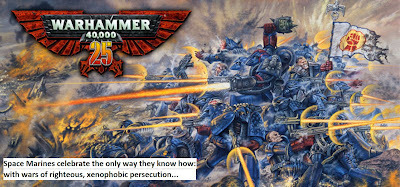 Happy Birthday, Warhammer! Indeed, Warhammer has reached the grand old age of 25 – which isn't half bad for a gaming and fiction milieu. It can now legally drink, smoke, drive, impregnate another fantastical universe and marry without our consent (but hopefully not in that order). Past and present devotees are celebrating in different ways. Parent company Games Workshop, for example, held a huge party across its hobby centres – staging timed tabletop battles, painting competitions and releasing limited edition miniatures to mark the occasion.
Happy Birthday, Warhammer! Indeed, Warhammer has reached the grand old age of 25 – which isn't half bad for a gaming and fiction milieu. It can now legally drink, smoke, drive, impregnate another fantastical universe and marry without our consent (but hopefully not in that order). Past and present devotees are celebrating in different ways. Parent company Games Workshop, for example, held a huge party across its hobby centres – staging timed tabletop battles, painting competitions and releasing limited edition miniatures to mark the occasion.Warhammer has brought me a great deal of entertainments and enjoyment – both as gamer and author – over those 25 years. I was fortunate enough to spend the celebrations at Warhammer World in Nottingham, where I was signing copies of Legion of the Damned and The Primarchs for eager readers. I was in good company. My Black Library colleagues Graham McNeill and Andy Smillie were also in attendance, signing copies of Iron Warriors: The Omnibus and Gotrek and Felix: The Anthology, respectively. The blogs of both authors can be found on the side bar.
I would like to say a big thank you to all the people who bought and brought books for me to sign. It was brilliant to meet you and chat. Particular highlights for me were an opportunity to sign my entire back catalogue - short stories, limited editions and all - and the opportunity to see fantastic miniature renditions of Bronislaw Czevak and his Inquisitorial retinue from Atlas Infernal, created by one of the competing gaming groups. (Guys – if you are reading this, the photo I took with my iphone is terrible and doesn't do your work justice, so I won't post it yet. If you can contact me through the blog and send me another, I'd really appreciate it, because I was seriously impressed!) I'd also like to say thank you to Eddie at GW for all the organising. Cheers!
Published on February 25, 2012 18:48



